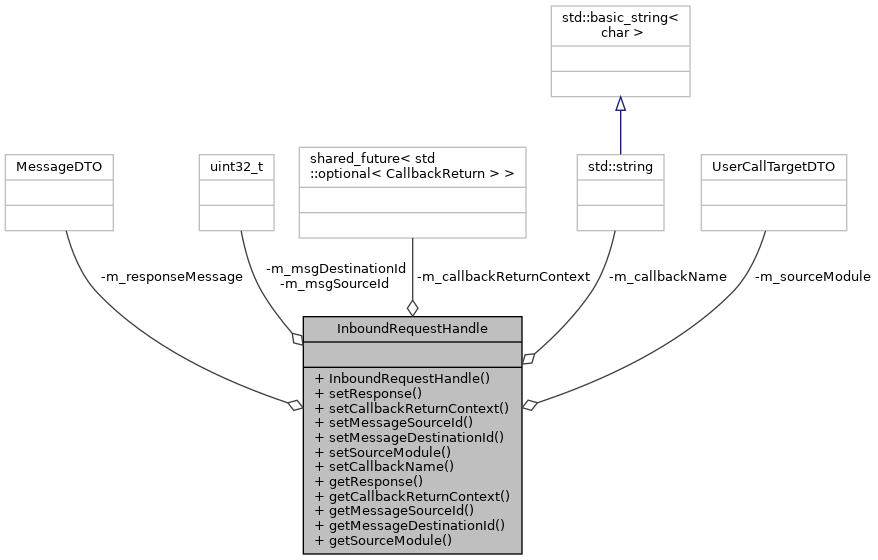#include <InboundRequestHandle.h>
Collaboration diagram for InboundRequestHandle:

Public Member Functions | |
| InboundRequestHandle ()=default | |
| void | setResponse (MessageDTO message) |
| void | setCallbackReturnContext (std::shared_future< std::optional< CallbackReturn >> future) |
| void | setMessageSourceId (uint32_t id) |
| void | setMessageDestinationId (uint32_t id) |
| void | setSourceModule (UserCallTargetDTO target) |
| void | setCallbackName (std::string name) |
| MessageDTO | getResponse () |
| std::shared_future< std::optional< CallbackReturn > > | getCallbackReturnContext () |
| uint32_t | getMessageSourceId () const |
| uint32_t | getMessageDestinationId () const |
| UserCallTargetDTO | getSourceModule () const |
Private Attributes | |
| std::string | m_callbackName |
| MessageDTO | m_responseMessage |
| std::shared_future< std::optional< CallbackReturn > > | m_callbackReturnContext |
| uint32_t | m_msgSourceId |
| uint32_t | m_msgDestinationId |
| UserCallTargetDTO | m_sourceModule |
Detailed Description
A class that contains various data to be returned by the handling of an incoming message.
Constructor & Destructor Documentation
◆ InboundRequestHandle()
|
default |
Member Function Documentation
◆ getCallbackReturnContext()
| std::shared_future< std::optional< CallbackReturn > > InboundRequestHandle::getCallbackReturnContext | ( | ) |
Here is the caller graph for this function:

◆ getMessageDestinationId()
| uint32_t InboundRequestHandle::getMessageDestinationId | ( | ) | const |
Here is the caller graph for this function:

◆ getMessageSourceId()
| uint32_t InboundRequestHandle::getMessageSourceId | ( | ) | const |
Here is the caller graph for this function:

◆ getResponse()
| MessageDTO InboundRequestHandle::getResponse | ( | ) |
Here is the caller graph for this function:

◆ getSourceModule()
| UserCallTargetDTO InboundRequestHandle::getSourceModule | ( | ) | const |
Here is the caller graph for this function:

◆ setCallbackName()
| void InboundRequestHandle::setCallbackName | ( | std::string | name | ) |
Here is the caller graph for this function:

◆ setCallbackReturnContext()
| void InboundRequestHandle::setCallbackReturnContext | ( | std::shared_future< std::optional< CallbackReturn >> | future | ) |
Here is the caller graph for this function:

◆ setMessageDestinationId()
| void InboundRequestHandle::setMessageDestinationId | ( | uint32_t | id | ) |
Here is the caller graph for this function:

◆ setMessageSourceId()
| void InboundRequestHandle::setMessageSourceId | ( | uint32_t | id | ) |
Here is the caller graph for this function:

◆ setResponse()
| void InboundRequestHandle::setResponse | ( | MessageDTO | message | ) |
Here is the caller graph for this function:

◆ setSourceModule()
| void InboundRequestHandle::setSourceModule | ( | UserCallTargetDTO | target | ) |
Here is the caller graph for this function:

Member Data Documentation
◆ m_callbackName
|
private |
◆ m_callbackReturnContext
|
private |
◆ m_msgDestinationId
|
private |
◆ m_msgSourceId
|
private |
◆ m_responseMessage
|
private |
◆ m_sourceModule
|
private |
The documentation for this class was generated from the following files:
- include/hivemind-bridge/InboundRequestHandle.h
- src/InboundRequestHandle.cpp
 1.8.17
1.8.17